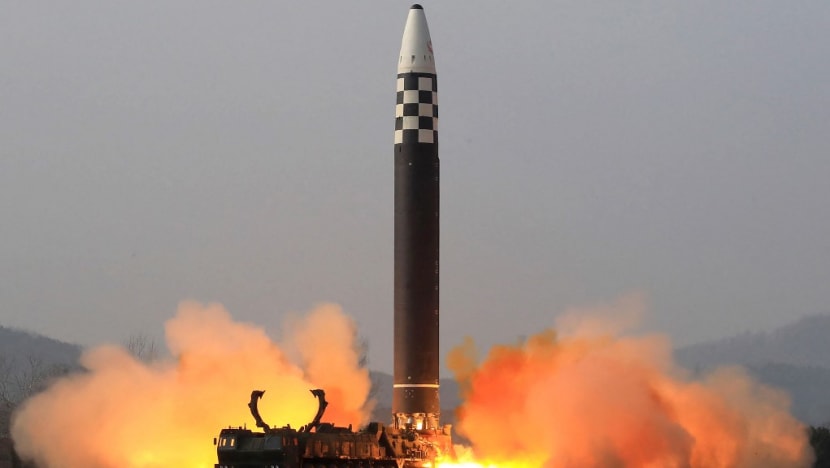Singapore condemns North Korea's intercontinental ballistic missile test

This picture taken on Mar 24, 2022 and released from North Korea's official Korean Central News Agency (KCNA) on Mar 25, 2022 shows the test launch of what state media reports a new type inter-continental ballistic missile (ICBM), the Hwasongpho-17. (Photo: STR/AFP/KCNA VIA KNS)
SINGAPORE: Singapore has called on North Korea to cease all provocations after it tested an intercontinental ballistic missile earlier this week, the Ministry of Foreign Affairs (MFA) said on Saturday (Mar 26).
On Thursday, North Korea fired its largest intercontinental ballistic missile, which reportedly travelled higher and further than any previous missile of its kind.
"Singapore condemns (North Korea's) test of an intercontinental ballistic missile on Mar 24, 2022, that has raised tensions on the Korean Peninsula and violated United Nations Security Council Resolutions," said MFA.
The ministry added that the test also breached North Korea's moratorium of 2018 on intercontinental ballistic missile tests.
"We call on the DPRK to cease all provocations immediately, and to abide by its international obligations and commitments," said MFA, using the official acronym for North Korea.
"MONSTER MISSILE"
Known as the Hwasong-17, the giant intercontinental ballistic missile was first unveiled in October 2020 and dubbed a "monster missile" by analysts.
It had never previously been successfully test-fired, and the launch prompted immediate outrage from Pyongyang's neighbours and the United States.
"The missile, launched at Pyongyang International Airport, travelled up to a maximum altitude of 6,248.5km and flew a distance of 1,090km for 4,052s before accurately hitting the pre-set area in open waters" in the Sea of Japan, KCNA said.
South Korea's military had estimated the range of the Thursday launch as 6,200km - far longer than the previous intercontinental ballistic missile, the Hwasong-15, which North Korea tested in November 2017.
The missile landed in Japan's exclusive economic zone, prompting anger from Tokyo, but KCNA said the test had been carried out "in a vertical launch mode" to ease neighbours' security concerns.
Following the test, Washington imposed new sanctions on entities and people in Russia and North Korea who are accused of "transferring sensitive items to North Korea's missile programme".












